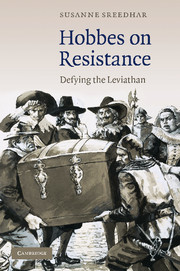1 - Hobbes's right of self-defense
Published online by Cambridge University Press: 04 April 2011
Summary
Questions about the nature, origin, and limits of political obligation are brought to bear in a particularly poignant way in the story of the death of Socrates. In the famous dialogue, Crito, Socrates wrestles with the question of whether his obligation to obey the laws of his government extends to an obligation to inflict a death sentence upon himself. Socrates concludes that he is obligated to obey, and so he refuses to escape when given the chance, and willingly drinks the hemlock the next morning. The philosophical case was not closed with Socrates' death, however, and the question of his putative obligation has been a subject of much subsequent debate in political philosophy.
Although we would not characterize it as such today, Socrates' case falls squarely within the realm of Hobbes's conception of the right of self-defense, in which Hobbes insists that subjects never have an obligation to obey a command to commit suicide. The goal of this chapter is to defend a particular interpretation of Hobbes's arguments for the existence of the right of self-defense. I begin by laying out the central features of this right, as Hobbes conceives it, and highlighting the uniqueness of Hobbes's theory of rights in general.
DEFINING HOBBES'S RIGHT OF SELF-DEFENSE
Hobbes never gives a precise definition of the right of self-defense, but one can be inferred from the various examples he gives of its exercise.
- Type
- Chapter
- Information
- Hobbes on ResistanceDefying the Leviathan, pp. 7 - 52Publisher: Cambridge University PressPrint publication year: 2010

